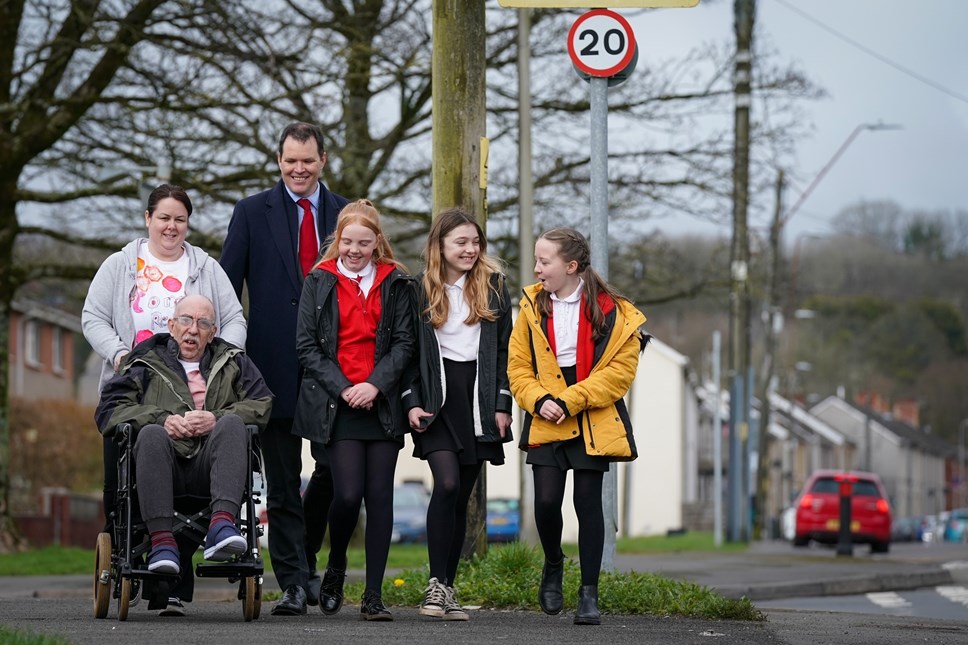
New data shows benefits of driving at 20mph as Wales prepares to lower default speed limit
Data newydd yn dangos manteision gyrru ar gyflymder o 20mya wrth i Gymru baratoi i ostwng y terfyn cyflymder diofyn
Slower driving speeds, increased levels of walking and cycling and minimal impact on journey times are among the key findings of a new report carried out in areas of Wales trialling the new default 20mph speed limit.
The interim monitoring report uses data gathered from the Welsh Government’s eight first phase areas and has been published today (Friday, March 17) – exactly six months before default limit is applied across Wales.
On September 17, the Welsh Government will introduce a default 20mph speed limit on restricted roads across Wales.
Restricted roads include where streetlights are placed no more than 200 yards apart and are usually located in residential and built-up areas with high pedestrian activity.
The move will see Wales become the first UK nation to introduce a lower speed limit following in the footsteps of European countries, such as Spain, where 30km/h (18.5mph) is already in place.
Evidence shows reducing the default speed limit from 30mph to 20mph, will see a number of benefits including a reduction in road collisions and serious injury, more people walking and cycling and improvements to health and wellbeing.
The report found that, on average, motorists are already driving slower in the first phase areas with an average speed reduction of 3mph recorded across all eight communities. Substantial behaviour change has been observed in St Brides Major and St Dogmaels (two of the first phase areas to be introduced) where the number of people driving at or below 24mph has increased from 23% to 45% and from 54% to 84% respectively.
Findings from other 20mph implementations in the UK show that even small reductions in average speeds across a road network where people live and work can result in substantial reductions in collisions and serious injury, helping to make communities safer.
The report also concluded that in areas where 20mph was introduced there has been more children walking, cycling, and scooting to school.
Using data from Living Streets’ Wow walk to school challenge, it reported that schools in 20mph areas have seen a greater increase in active travel journeys (49% to 74%), compared to schools predominantly in 30mph areas (49% to 67%).
Deputy Minister for Climate Change, with a responsibility for transport, Lee Waters said:
“This latest data is already showing the benefits we can expect to see across Wales thanks to the bold move we are taking to lower the default speed limits later this year.
“Decisions like this can be unpopular and we know that change is never easy, however, evidence from around the world is clear – reducing speed limits save lives.
“We have made progress on reducing deaths and serious injuries on our roads over the 21 years of devolution, but we still need to do more to make the communities we work and live in safer.
“A reduction to 20mph on our residential and other busy pedestrian urban roads has to be the way forward.”
Joshua James, Public Affairs Manager, Living Streets Cymru added;
“Introducing 20mph as the default speed on our streets will improve the places where we live, work and go to school – and it will also save lives.
“We are pleased to be working with the Welsh Government to ensure that our streets and pavements are safe and accessible for everyone in our communities, so that more people feel encouraged to walk or cycle.”
A national communications campaign to help communities get ready for the change to 20mph has been launched today.
Notes to editors
The Welsh Government committed to publishing an Interim Monitoring Report (this report) for Phase 1, based on data collected up until six months after the final trial area was implemented. This report therefore refers primarily to data collected by the end of November 2022.
The Welsh Government will continue to gather data from phase 1 trial areas, gradually expanding to more extensive monitoring following the national roll-out in September.
Living Streets and WOW
The Welsh Government commissioned Living Streets to work with primary schools within the Phase 1 trial areas and in control locations during the 2021-22 academic year to better understand travel behaviours and attitudes towards active travel (walking, wheeling, and cycling).
WOW is an incentive-based scheme to encourage children to walk or cycle to primary school.
The WOW tracker is used as part of classroom activities to monitor school travel behaviour. Schools were given resources to promote the challenge and log journeys with 3,036 children taking part.
